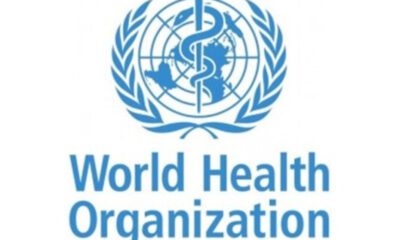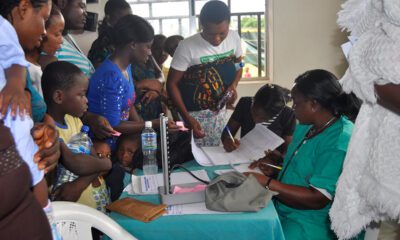Health
WHO appeals for $1.5bn to deliver healthcare in crises
The World Health Organisation (WHO) on Monday launched a $1.5 billion emergency appeal to provide care to more than 87 million people affected by ongoing crises in 2024, including in Africa the occupied Palestinian territory, Ukraine, Sudan, Syria and the Horn of Africa.
The appeal comes at a time when climate change, drought and other extreme weather events, are fuelling food insecurity, conflict and displacement, causing deeper and increasingly complex health emergencies, leaving healthcare increasingly under fire.
Every humanitarian crisis is a health crisis, WHO said, and each dollar invested in its lifesaving work nets a return on investment of at least $35.
Speaking from the UN agency’s headquarters in Geneva, Director-General Tedros Ghebreyesus urged donors and governments to step up support.
“There are only two ways to reduce the human suffering caused by health crises: increase the funding or reduce the needs. Neither is happening at the moment,” he said in a statement.
The UN Humanitarian Affairs and Emergency Relief Coordinator, Martin Griffiths, fully endorsed the appeal, saying it represented “a very small price to pay to protect the health of the most vulnerable and to prevent deepening of the global health crisis.”
For example, he said nine months of war in Sudan has stretched the country’s health system far beyond its capacity, affecting people who depend on everyday care as well as civilians injured in the fighting.
Additionally, weak disease surveillance and low vaccine coverage for preventable diseases have contributed to recurrent measles outbreaks.
Similar situations have occurred in Haiti, Somalia, Yemen, and many other countries, where infectious diseases such as cholera are both being driven by and exacerbating the broader humanitarian crisis. One billion people worldwide are now at risk of the deadly waterborne disease.
Meanwhile, “global health is under threat like never before,” Griffiths said. In 2023, 1,300, attacks on healthcare across 19 countries were reported, leading to more than 700 deaths and 1,100 injuries to health workers and patients.
Since the start of the current hostilities between Hamas and Israel, there have been more than 624 attacks on healthcare in the occupied Palestinian territories, he said, resulting in the deaths of 619 health workers and patients, and another 826 injured.
Also speaking, Dr Mike Ryan, the head of WHO’s Health Emergencies Programme, echoed this concern.
“We are witnessing an era in which attacking healthcare has become a tactic of war – not euphemistically referred to before as collateral damage or accidental damage, but actually fundamentally a weapon that is used to increase the terror and to deny people the health service that they need,” he said.
February, marks two years since the start of the Russian invasion of Ukraine, where healthcare is “not just a service”, according to the UN’s top humanitarian official in the country, Ms Denise Brown.
“The availability of healthcare holds a community together,” she said, speaking from Geneva. “So, I would argue that the loss of healthcare also is the beginnings of the loss of a sense of community.”
Citing WHO, she said there have been more than 1,400 attacks on health infrastructure in Ukraine since the war began, and 14 have occurred since Dec. 29, 2023.
Brown praised the dedicated healthcare professionals in Ukraine who continued to require immediate support from WHO and other institutions, but voiced concern over a potential decrease in humanitarian funding this year.
Earlier on Monday, the UN launched a $4.2 billion humanitarian appeal for the country.
“The war is not over, the suffering continues, and the support of Member States continues to be absolutely fundamental to the work that we do, including in healthcare,” she said.
Health
Assembly passes Kano Pre-Marital Health Screening Bill


Kano State House of Assembly has passed a bill for a law to compel intending couples to undergo HIV, hepatitis and sickle cell anaemia screening before marriage.
The passage followed deliberations in the Committee of the Whole House during plenary session,
presided over by the Speaker, Ismail Falgore on Monday in Kano.
After deliberations, the lawmakers approved the 3rd reading of the bill, read by the Deputy Clerk, Alhaji Nasiru Magaji.
Shortly after passage of the bill, the Majority Leader of the house, Lawan Hussein (NNPP-Dala), stated that “any person
intending to marry shall first submit self for medical examinations.”
He said the bill was considered and passed after the 3rd reading, following various legislative processes.
The leader further said that the bill was passed because the state had been battling with different health issues, including
HIV because people go into marriages without medical screening.
He said that the bill, if signed into law, would save many lives and curb the spread of life-threatening diseases.
“The bill will safeguard the health of citizens by institutionalising pre-marital testing to check the spread of diseases
like hepatitis, HIV and sickle cell anaemia,” he added.
Health
WHO to begin vaccination against Human Papilloma Virus May 27 in Kogi



The World Health Organisation (WHO), says it plans to commence vaccination against Human Papilloma Virus (HPV) on May 27 in Kogi.
The state’s Team Lead of WHO, Dr Muktar Toyosi, said this when he led his team on an advocacy visit to the State Council of the Nigeria Union of Journalists (NUJ) on Wednesday in Lokoja.
Toyosi said that the vaccination was meant for girl child of between the age nine and 14.
He said the ongoing sensitisation was to keep the people informed, and educate them on the vaccination of their children to protect them against cervical cancer in future.
”Kogi falls within the second phase of the programme. We are soliciting for the cooperation of the media in educating the people of the state on the HPV vaccination.
“There need for girls child across the state to take the vaccination to safeguard their future.
“Although the vaccine was initially scarce and difficult to get, the good news now is that it has been made available by the government,” Toyosi said.
Also speaking, the State Technical Assistant for WHO, Dr Ahmed Attah, said that the HPV mostly affect women, adding that the vaccination remained a preventive measure against the disease.
Attah, a former state Chairman of the Nigeria Medical Association (NMA) and a former Chief Medical Director (CMD), Kogi Specialist Hospital (KSSH) Lokoja, urged parents and guardians to avail their children of the vaccination to justify government’s investment.
In his response, the Kogi NUJ Chairman, Mr Seidu Ademu, described the health sector as very critical, stressing that the vaccination was a right step in the right direction.
Ademu promised a robust partnership with WHO to enable the team to achieve its set goals.
He stressed the need to inform, educate and sensitise the general public on the need to embrace the vaccine by ensuring that girls within the age range were vaccinated.
Health
NCDs will be leading cause of mortality in Africa by 2030 – WHO



The World Health Organisation (WHO) says Non-communicable Diseases (NCDs) will become the leading cause of mortality in Africa by 2030 if urgent measures are not executed by member states.
Dr Matshidiso Moeti, WHO Regional Director for Africa, joining virtually, made the assertion on Tuesday at the opening of the first International Conference on PEN-Plus in Africa (ICPPA 2024) in Dar es Salaam, Tanzania.
The ICPPA 2024, holding from April 23 to April 25, is aimed at addressing severe NCDs in Africa.
It is being hosted by the WHO Regional Office for Africa, Helmsley Charitable Trust, and the United Republic of Tanzania. Moeti urged member states to embrace strategies that would help to address the issue.
“We are faced with non-communicable diseases and data from low and middle income countries show that 26 per cent of total health spending was due to NCDs, second only to infectious and parasitic diseases.
“Meaning it is urgent to give these often overlooked diseases priority attention as Africa is severely affected and more than in any other place in the world.
“The surge in the burden of NCDs on our continent over the past two decades, is driven by increasing incidences of risk factors, such as unhealthy diets, reduced physical activity, obesity, and air pollution.
“NCDs are set to overtake communicable, maternal, neonatal and nutritional diseases combined as a leading cause of mortality in Africa by 2030.
“And here, the NCDs are called silent epidemics. Unfortunately, this rapid devolution, with a higher mortality rate has not been recognised in the region, because we’re not investing adequately in detecting and lowering the burden of these diseases,” Moeti said.
Moeti noted that severe NCDs like type one diabetes, rheumatic heart disease, and sickle cell disease more frequently affect children and young adults in the majority of Africans population.
She advised that Africa must show increased commitment in addressing NCDs with adequate and sustained resources.
She also said there was the need to strengthen accountability and assess the impact of interventions by enhancing surveillance and monitoring.
According to Moeti, this can be achieved using reliable and timely data at national and sub national levels to drive policy and action as we move forward.
Ms Elke Wisch, UNICEF Representative to Republic of Tanzania, said that collaboration was at the heart of collective response to tackling NCDs.
“Today’s gathering underscores the urgency and importance of addressing NCDs comprehensively and collaboratively.
“The WHO package of essential non communicable interventions for PEN, for primary healthcare and low resources settings, and the recently launched regional strategy on PEN-Plus provides a strategic framework for tackling NCDs at their roots,” she said.
Also speaking, Ummy Mwalimu, Minister of Health, Tanzania, said that non communicable diseases NCDs, have become a formidable threat to the health and wellbeing of “our people.”
She urged for collective efforts to address these threats.
“They are silently affecting the lives of our citizens, our communities, undermining the progress we strive to achieve as a nation.
“The impact of these diseases extends beyond individual suffering.
“It affects our communities, our economy, and ultimately the future of our nations in our continent.
“Yet, in the face of these challenges, we are not discouraged together. We have chosen to confront these non-communicable diseases.’’
She urged for lifestyle change as positive way to combatting the negative outcomes of NCDs.
James Reid, Programme Officer for the Helmsley Charitable Trust’s Type 1 Diabetes (T1D) Programme, said he was happy at the level of interest and momentum in engagements to address NCDs, especially Type 2 diabetes.
He, however, identified finance as one of the biggest challenge and hindrance. He said that while political leaders and stakeholders identify the challenges that NCDs pose, the strategies to prevent them, especially NCD care, were limited.
“Leadership for driving of PEN-Plus is very important to make sure that ministry of health leaders and all others involved, really understand how to change the dynamics as well as adopt solutions to suit specific localities,” she said.
WHO’s PEN-Plus (Package of Essential NCD-Plus), is a regional integrated care delivery strategy to address severe non-communicable diseases at first-level referral health facilities.
At the 2022 WHO Regional Committee Meeting for the African Region, the 47 Member States of the AFRO region voted to adopt the PEN-Plus strategy.
It is focused on alleviating the burden among the poorest children and young adults. This is by increasing the accessibility and quality of chronic care services for severe NCDs including Type 1 diabetes, rheumatic heart disease, and sickle cell disease.
ICPPA 2024 provides opportunity to shore up international support for scaling up PEN-Plus in the African Region. Also, the conference serves as a platform to raise awareness of severe NCDs, share lessons from countries implementing PEN-Plus and identify opportunities to strengthen NCD management.
-
capital market2 years ago
Rt.briscoe, FBNH, Others halts negative performance of stock market
-
Finance3 months ago
Court orders Sen. Victor Umeh to repay N136m bank debt to AMCON
-



 Abuja Update2 months ago
Abuja Update2 months agoUNDP, FG partnership needed to achieve inclusion, equity- Minister
-
Abuja Update1 month ago
Banks drive stock market performance with N147bn gain
-



 Business1 week ago
Business1 week agoTingo Group unveils Tingo Electric, Tingo Cola drink at Lagos launch
-



 Health2 weeks ago
Health2 weeks agoCapacity training will reduce migration of health workers- NPHCDA
-
News4 months ago
Oil thieves sponsoring malicious media campaign against Navy – Spokesman
-



 Infotech1 month ago
Infotech1 month agoWorld Backup Day: NITDA urges Nigerians to ensure backup of data










